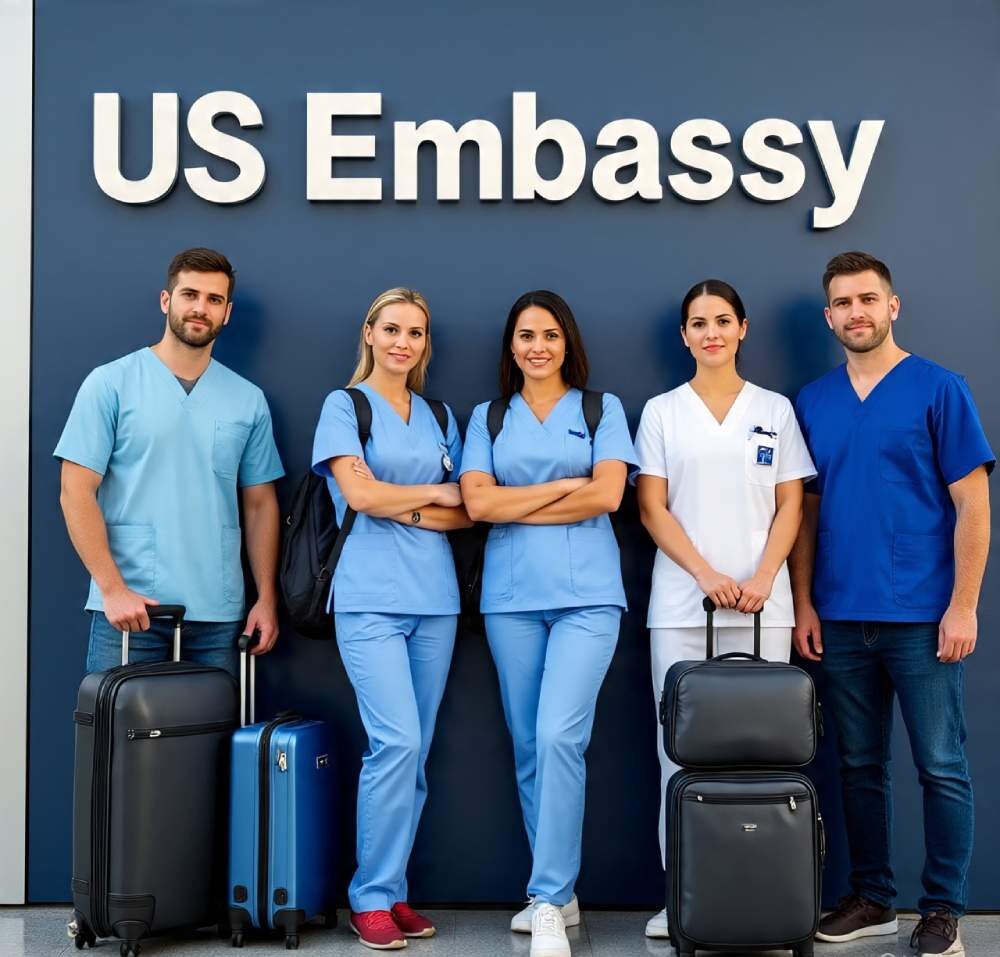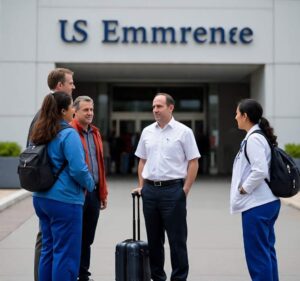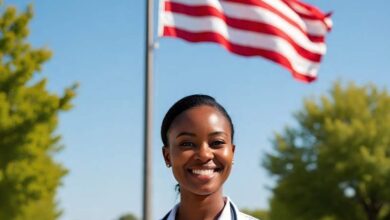10 Expert Visa Interview Tips to Ace Your Interview with Confidence (2026 Update)
Win Over the Officer: Speak Confidently in English 2026

These expert visa interview tips are designed to help you confidently prepare for your appointment at the U.S. Embassy or Consulate in your home country, increasing your chances of success.
Visa Interview Tips: Your Complete Guide to Acing the Process with Confidence

Preparing for a U.S. visa interview can feel overwhelming—especially for international students facing the process for the first time. After months of hard work completing applications, securing admission to a U.S. school, and gathering required documents, everything now depends on how you perform in a short, high-stakes interview. That’s why following the right visa interview tips can be the difference between approval and rejection.
The visa interview is not just a formality; it’s a critical step where you must prove that your intent to study in the United States is genuine, temporary, and fully aligned with U.S. immigration requirements. In most cases, the consular officer will make a decision in just a few minutes. You won’t get a second chance to make a good first impression. These expert visa interview tips are designed to help you succeed by boosting your preparation, confidence, and communication skills.
Whether you’re applying for an F-1 visa or planning to bring your family along, knowing how to answer questions clearly, provide supporting documents efficiently, and explain your long-term goals is essential. This guide offers 10 expert visa interview tips that cover everything from your appearance and mindset to how you explain your academic plans and ties to your home country. Each tip comes from real-life experience and insights shared by former consular officers and seasoned international students.
One of the most important visa interview tips is understanding how U.S. immigration law views non-immigrant visa applicants. Every applicant is presumed to be an intending immigrant unless they can prove otherwise. This means it’s your responsibility to demonstrate strong reasons to return home after your studies—reasons such as family obligations, career opportunities, financial commitments, or long-term goals rooted in your home country. The more convincing your ties, the better your chances.
Another powerful visa interview tip involves communication. Many students underestimate how important it is to speak clearly in English during the interview. Even if you’re only going to the U.S. to study English, you must be able to explain why learning the language is valuable to your future. Practicing your English ahead of time with native speakers or mentors can make a big difference in how confident and prepared you feel. In fact, one of the simplest yet most effective visa interview tips is just this—practice speaking out loud.
It’s also important to know that the consular officer is interviewing you, not your family. One of the most underrated visa interview tips is to attend the interview alone, even if your parents accompany you to the embassy. Having someone else speak for you may signal a lack of independence and readiness. You’re expected to confidently discuss your academic plans, finances, and reasons for studying in the U.S.—all without outside help.
These visa interview tips also emphasize preparation over improvisation. You’ll need to have your documents in order, anticipate common questions, and be ready to explain how your U.S. education connects to your goals back home. Don’t memorize robotic answers—instead, rehearse your key talking points until they sound natural. The consular officer is looking for sincerity and clarity, not perfection.
Finally, one of the most strategic visa interview tips is to approach the entire process with the mindset of a professional. Treat the interview like a job interview: dress well, make eye contact, and show up with confidence and a clear purpose.
In the sections that follow, we’ll walk you through all 10 expert visa interview tips to help you present the strongest possible case. Whether you’re applying from a high-risk country or simply nervous about what to expect, this guide will give you practical, reliable advice to ace your U.S. visa interview with confidence.

Practice Speaking in English Another crucial visa interview tip is to be prepared to speak in English, as the interview will typically be conducted in English—not your native language. Practicing conversational English with a fluent or native speaker beforehand can boost your confidence and help you respond clearly. If your primary reason for traveling to the U.S. is to study English, be ready to explain how those language skills will benefit you professionally or personally in your home country.
Attend the Interview Alone One of the most overlooked visa interview tips is to attend the interview alone, without parents or family members. The consular officer is evaluating you, not your family, and bringing others into the room can create a negative impression or suggest a lack of independence. You’re expected to speak confidently on your own behalf. If you’re a minor applying for a high school program, parents may accompany you to the embassy but should remain in the waiting area unless specifically called upon—for instance, to clarify financial support.
Clearly Explain Your Study Plans Among the most important visa interview tips is the ability to clearly explain why you chose your specific program of study in the United States. If you can’t articulate your academic goals, the consular officer may question whether your primary intention is truly to study. Be prepared to discuss how the program aligns with your future career plans in your home country, and why studying in the U.S. is essential to achieving those goals.
Make a Strong First Impression One of the most practical visa interview tips is to make a strong first impression—quickly. Due to the high volume of applications, consular officers often form their decisions within the first minute or two of the interview. Your appearance, confidence, and clarity matter from the very beginning. Answer questions honestly, but keep your responses brief and focused. Rambling or giving unnecessary details can weaken your message and waste valuable time. Be clear, confident, and direct.
Organize Your Documents Clearly A key visa interview tip many applicants overlook is how they organize their supporting documents. Make sure any paperwork you present is clearly labeled and easy for the consular officer to understand at a glance. Avoid submitting long written explanations—they won’t have time to read them during your brief 2–3 minute interview. Keep everything neat, concise, and easy to reference to avoid unnecessary delays or confusion.
Prepare for Additional Scrutiny (if Applicable) Here’s a crucial visa interview tip for applicants from countries facing economic hardship or high rates of visa overstays: Be prepared for tougher questions. If you’re from a country where many students have previously remained in the U.S. after their studies, consular officers may scrutinize your intentions more closely. Expect to be asked about your job prospects and long-term plans in your home country. The stronger your ties and career plans back home, the better your chances of approval.
Emphasize Education Over Employment One of the most essential visa interview tips is to emphasize that your primary reason for coming to the United States is education—not employment. While limited student work opportunities may exist, they are secondary to your goal of completing your studies. Clearly communicate your academic intentions and your plan to return home after graduation.
If your spouse is applying for an F-2 dependent visa, understand that they are not permitted to work in the U.S. Be ready to explain how your spouse plans to spend their time—acceptable activities include part-time study or volunteer work. Demonstrating that your family respects U.S. visa rules strengthens your overall case.
Explain How Your Family Will Manage Without You Another important visa interview tip is to be ready to explain how your spouse and children will manage financially if they are staying behind while you study in the United States. This is especially critical if you are the primary earner in your household. If the consular officer suspects your family will rely on money you send from the U.S. to support themselves, your visa may be denied. To avoid this, clearly outline their financial independence during your absence. If your family plans to join you later, it’s best for them to apply at the same consulate where you obtained your visa.
Stay Calm, Even If Denied One of the most valuable visa interview tips to remember is to stay calm and respectful—especially if your application is denied. Never argue with the consular officer. Instead, politely ask if they can provide a written explanation for the refusal and what documents you could bring to strengthen a future application. Maintaining a professional and cooperative attitude leaves the door open for a successful reapplication.
Preparing for your U.S. visa interview can be nerve-wracking, but the right guidance can make all the difference. This guide covers 10 expert visa interview tips to help you approach your appointment with clarity, confidence, and a higher chance of success.
Tips to Ace Your Interview with Confidence: visa interview tips
In the sections that follow, we’ll walk you through all 10 expert visa interview tips to help you present the strongest possible case. Whether you’re applying from a high-risk country or simply nervous about what to expect, this guide will give you practical, reliable advice to ace your U.S. visa interview with confidence.


1. Ties to Home Country
One of the most important visa interview tips is understanding how U.S. immigration law works. By default, all non-immigrant visa applicants are presumed to be intending immigrants unless they can clearly demonstrate strong reasons to return to their home country. To convince the consular officer, you must show solid personal, professional, or financial ties, such as stable employment, close family connections, property ownership, or long-term career prospects.
If you’re applying as a student, be prepared to explain your educational goals, future career plans in your home country, academic performance, and how your studies fit into your long-term objectives. Remember, there is no single document or guaranteed answer that ensures visa approval—every case is unique, and your ability to communicate your intentions confidently is key.
2. English
Another crucial visa interview tip is to be prepared to speak in English, as the interview will typically be conducted in English—not your native language. Practicing conversational English with a fluent or native speaker beforehand can boost your confidence and help you respond clearly. If your primary reason for traveling to the U.S. is to study English, be ready to explain how those language skills will benefit you professionally or personally in your home country.
3. Speak for yourself
One of the most overlooked visa interview tips is to attend the interview alone, without parents or family members. The consular officer is evaluating you, not your family, and bringing others into the room can create a negative impression or suggest a lack of independence. You’re expected to speak confidently on your own behalf. If you’re a minor applying for a high school program, parents may accompany you to the embassy but should remain in the waiting area unless specifically called upon—for instance, to clarify financial support.
4. Know the Program and How it Fits Your Career Plans
Among the most important visa interview tips is the ability to clearly explain why you chose your specific program of study in the United States. If you can’t articulate your academic goals, the consular officer may question whether your primary intention is truly to study. Be prepared to discuss how the program aligns with your future career plans in your home country, and why studying in the U.S. is essential to achieving those goals. A strong, purpose-driven explanation shows that you’re a serious student—not an intending immigrant.
5. Be Concise
One of the most practical visa interview tips is to make a strong first impression—quickly. Due to the high volume of applications, consular officers often form their decisions within the first minute or two of the interview. Your appearance, confidence, and clarity matter from the very beginning. Answer questions honestly, but keep your responses brief and focused. Rambling or giving unnecessary details can weaken your message and waste valuable time. Be clear, confident, and direct.
6. Supplemental Documentation
A key visa interview tip many applicants overlook is how they organize their supporting documents. Make sure any paperwork you present is clearly labeled and easy for the consular officer to understand at a glance. Avoid submitting long written explanations—they won’t have time to read them during your brief 2–3 minute interview. Keep everything neat, concise, and easy to reference to avoid unnecessary delays or confusion.
7. Not All Countries Are Equal
Here’s a crucial visa interview tip for applicants from countries facing economic hardship or high rates of visa overstays: Be prepared for tougher questions. If you’re from a country where many students have previously remained in the U.S. after their studies, consular officers may scrutinize your intentions more closely. Expect to be asked about your job prospects and long-term plans in your home country. The stronger your ties and career plans back home, the better your chances of approval.
8. Employment
One of the most essential visa interview tips is to emphasize that your primary reason for coming to the United States is education—not employment. While limited student work opportunities may exist, they are secondary to your goal of completing your studies. Clearly communicate your academic intentions and your plan to return home after graduation.
If your spouse is applying for an F-2 dependent visa, understand that they are not permitted to work in the U.S. Be ready to explain how your spouse plans to spend their time—acceptable activities include part-time study or volunteer work. Demonstrating that your family respects U.S. visa rules strengthens your overall case.
9. Dependents Remaining at Home
Another important visa interview tip is to be ready to explain how your spouse and children will manage financially if they are staying behind while you study in the United States. This is especially critical if you are the primary earner in your household. If the consular officer suspects your family will rely on money you send from the U.S. to support themselves, your visa may be denied. To avoid this, clearly outline their financial independence during your absence. If your family plans to join you later, it’s best for them to apply at the same consulate where you obtained your visa.
10. Maintain a Positive Attitude
One of the most valuable visa interview tips to remember is to stay calm and respectful—especially if your application is denied. Never argue with the consular officer. Instead, politely ask if they can provide a written explanation for the refusal and what documents you could bring to strengthen a future application. Maintaining a professional and cooperative attitude leaves the door open for a successful reapplication.
Credit and Acknowledgment:
These expert visa interview tips are adapted and inspired by guidance originally compiled by NAFSA: Association of International Educators, with contributions from experienced professionals including Gerald A. Wunsch, Esq., a former U.S. Consular Officer, and Martha Wailes of Indiana University. Special thanks to the U.S. Department of State for providing valuable insights that continue to support international students worldwide.
https://travel.state.gov/content/travel/en/us-visas/visa-information-resources/visa-denials.html




